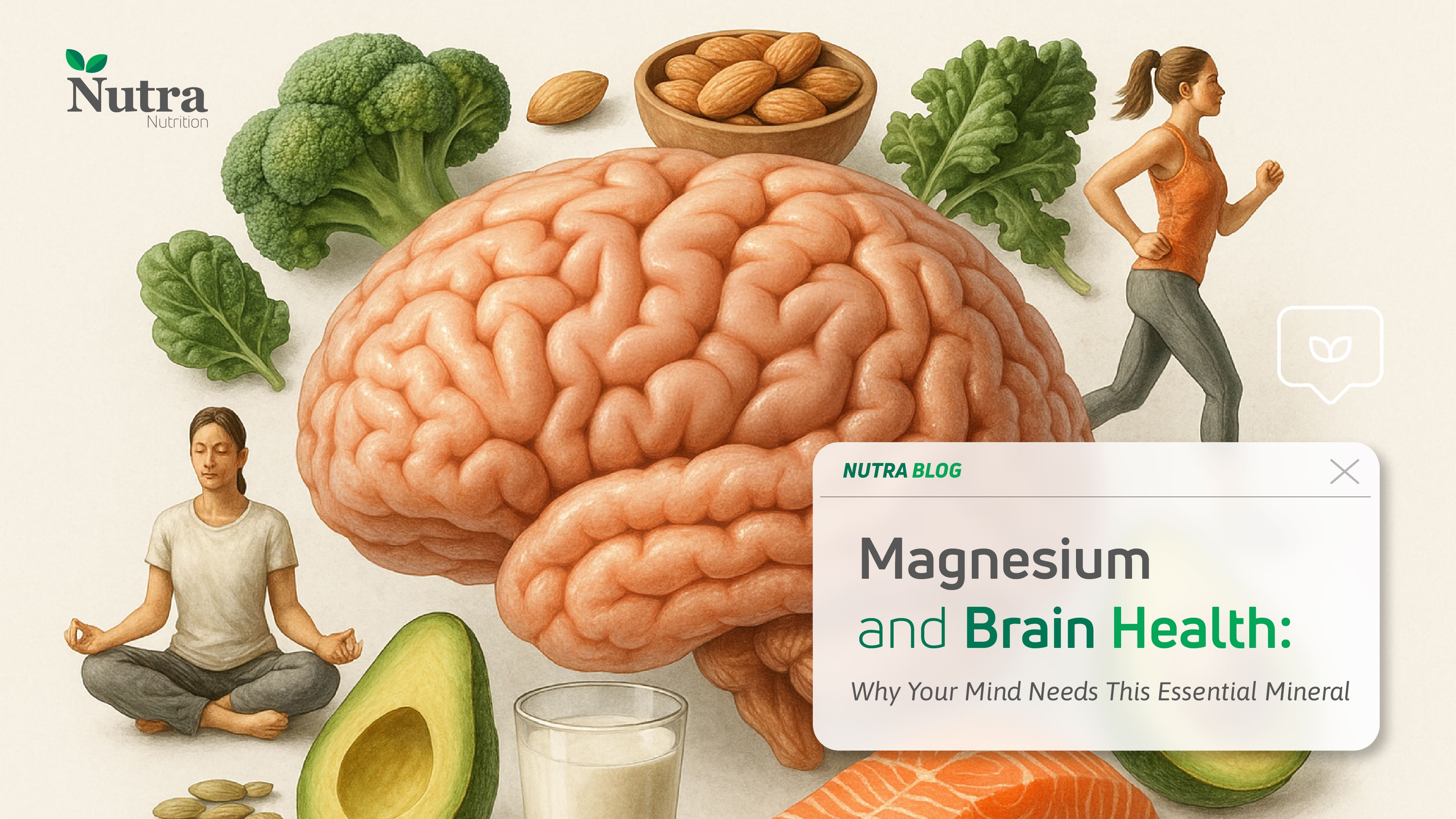Magnesium and Brain Health: Why Your Brain Needs This Essential Mineral
- Home
- Nutra Blog: Health and Nutrition
- Magnesium and Brain Health: Why Your Brain Needs This Essential Mineral

Magnesium and Brain Health: Why Your Brain Needs This Essential Mineral
Jun 7, 2025
By
Nutra Llc
0 comment(s)
When people think of magnesium, they often link it to muscle recovery or energy levels. But what many do not realize is that magnesium plays a crucial role in brain health too. From regulating mood to protecting against age-related cognitive decline, this mineral is a quiet but powerful ally for your brain.
The Brain-Magnesium Connection
Magnesium is involved in over 300 enzymatic reactions in the body, many of which directly affect the brain. It helps maintain the health of nerve cells, supports neurotransmitter function, and is involved in the processes that regulates learning and memory. Magnesium and energy production also regulates hand in hand, fueling cellular processes in both the body and the brain.
When magnesium level are low, the brain can become more prone to stress, inflammation, and excitotoxicity; all of which can lead to brain cell damage. These conditions are often linked to anxiety, depression, and long-term cognitive issues. Maintaining adequate levels of magnesium helps with fatigue management and may support natural health solutions for mental well-being.
What Science Says
Recent studies have revealed compelling links between magnesium and brain structure and function. One study published in the European Journal of Nutrition (2023) analyzed over 6,000 adults and found that higher magnesium intake was associated with larger brain volumes and fewer white matter lesions—key indicators of a healthy brain. These benefits were especially pronounced in women, particularly after menopause.
In other words, people who consumed more magnesium had brain volumes that resembled those of younger individuals. That's significant, especially considering that brain shrinkage is a natural part of aging and a major factor in cognitive decline.
Another study by Harvard Health Publishing highlighted that magnesium-rich foods may help slow brain aging and improve cognitive performance, especially in older women. And research from Psiquiatria.com noted that magnesium has a calming effect on the nervous system and is being studied for its role in supporting people with anxiety, depression, and other mental health conditions.
Early Prevention Starts Now
Dementia and other neurodegenerative diseases are on the rise. It’s estimated that by 2050, the number of people with dementia worldwide will triple. Since there is no definitive cure, prevention is our best defense—and that starts with lifestyle changes.
Unlike some risk factors, your diet is something you can control. Magnesium is a key nutrient that can help strengthen your brain's resilience, especially when intake is consistent over time. Unfortunately, most diets are low in magnesium due to high consumption of processed foods and low intake of leafy greens, seeds, legumes, and whole grains.
Getting Enough Magnesium
You can increase your magnesium levels through:
● Eating more spinach, pumpkin seeds, almonds, black beans, and other foods high in magnesium
● Reducing intake of processed foods and sugary snacks
● Supplementing with high-bioavailability forms like magnesium citrate, magnesium glycinate, or magnesium as a supplement can support better absorption and effectiveness.
These are among the best magnesium supplements for energy, sleep, and brain function. For example, the benefits of magnesium citrate include improved digestion and regularity. Many use it as a supplement for magnesium deficiency and to help with magnesium for sleep.
Not all magnesium is the same. There is a difference between magnesium citrate vs magnesium glycinate: citrate is often used for digestion and sleep, while glycinate is praised for its calming effect, especially for magnesium for calming and managing stress.
If you have been wondering about the benefits of magnesium glycinate or asking, "What are the benefits of magnesium?" The answer spans from mental clarity to better rest and even inflammation reduction.
Including magnesium-rich foods, magnesium food supplements, and the proper supplemental magnesium in your daily routine can make a meaningful difference in your cognitive and emotional well-being.
Final Thoughts
Magnesium is more than just a mineral for muscles—it is essential for mental clarity, emotional balance, and long-term brain health. If you want to boost focus, support memory, or simply protect your mind as you age, consider making magnesium a regular part of your diet. Because when your brain is healthy, everything else gets better too.
At Nutra LLC, we are committed to supporting your wellness journey. Explore our range of high-quality magnesium dietary supplements to find the right fit for your health needs. Visit www.storenutra.com to learn more!
References
● Alateeq K, Walsh EI, Cherbuin N. Dietary magnesium intake is related to larger brain volumes and lower white matter lesions with notable sex differences. Eur J Nutr. 2023 Aug;62(5):2039-2051. doi: 10.1007/s00394-023-03123-x. Epub 2023 Mar 10. PMID: 36899275; PMCID: PMC10349698.https://pmc.ncbi.nlm.nih.gov/articles/PMC10349698/
● Harvard Health Publishing. (2023). Magnesium-rich foods might boost brain health, especially in women. https://www.health.harvard.edu/mind-and-mood/magnesium-rich-foods-might-boost-brain-health-especially-in-women
● Psiquiatria.com. (n.d.). El magnesio y su importancia en la salud mental: Un aliado esencial para los profesionales de la salud. https://psiquiatria.com/psicologia-general/el-magnesio-y-su-importancia-en-la-salud-mental-un-aliado-esencial-para-los-profesionales-de-la-salud
*Disclaimer: Statements made, or products sold through this website, have not been evaluated by the United States Food and Drug Administration.
They are not intended to diagnose, treat, cure or prevent any disease.
